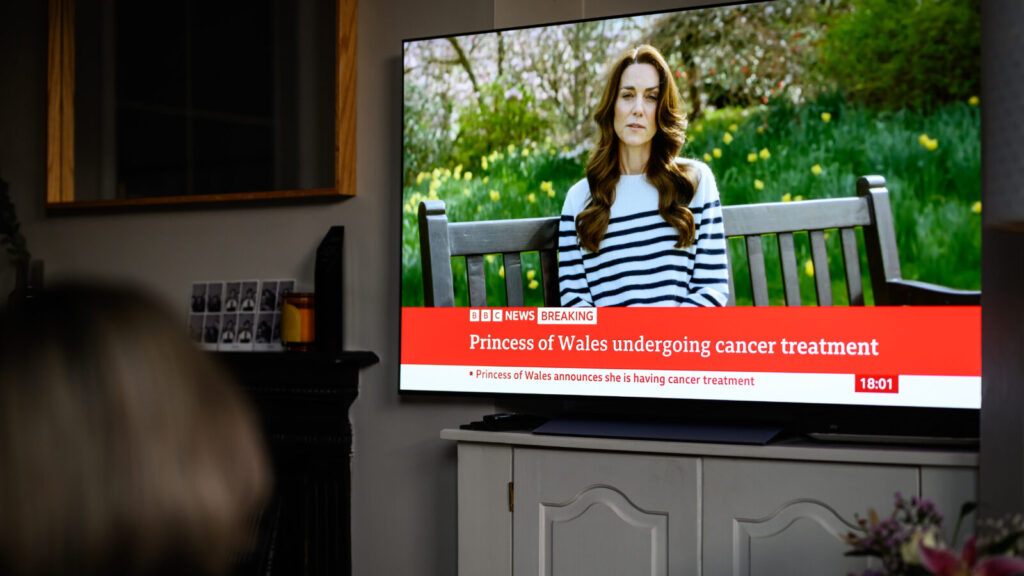The impetus for more attention to celebrity illness stemmed from the growing obsession with celebrities in 1920s America. Whether it was movie stars like Rudolph Valentino and Mary Pickford, or sports stars like Babe Ruth and Jack Dempsey, tabloids, newsreels, and radio increasingly covered both their professional and personal lives. “Names make news,” famed publisher William Randolph Hearst once said, and he was right.
An athlete, New York Yankees’ first baseman Lou Gehrig helped make celebrity illnesses part of this phenomenon. As is now well known, Gehrig had been unable to hit and field adequately during spring training in 1939. Still, the “Iron Horse,” who had played more consecutive games than anyone else in major league history, started the season at first base. But on May 3, manager Joe McCarthy pulled him from the lineup. As with Kate Middleton, there was wide-scale speculation as to what was occurring, ranging from exhaustion to a brain tumor.
These rumors abruptly ended seven weeks later, on June 21, when Gehrig’s physician issued a statement indicating that Gehrig had been hospitalized at the Mayo Clinic and diagnosed with amyotrophic lateral sclerosis. What is especially notable is that Gehrig gave his permission for this announcement, believing that the public had a right to know. Being less candid had been discussed, but rejected. Gehrig’s doctor told the truth: the ballplayer had ALS, now also known as Lou Gehrig’s disease. At the time, any layperson with access to a medical dictionary would have learned that Gehrig’s illness was fatal, and that he probably had only a few years to live.
When Gehrig died at age 37 on June 2, 1941, he was a hero not only due to his baseball career, but the courage with which he had endured his fatal illness. And he had educated most Americans for the first time about ALS and other related neurological diseases.
Did public figures need to disclose their diagnoses? One person who thought so was John Foster Dulles, the U.S. secretary of state when he was diagnosed with colon cancer in 1956. Like Gehrig, Dulles was given the option of being vague but believed, as an official serving the American people, that they deserved to know he was ill. This decision was in contrast to other politicians, such as Presidents Franklin D. Roosevelt and John F. Kennedy, who concealed their illnesses. But Dulles’ approach won the day, and now there is a general consensus, at least in the U.S., that elected or appointed politicians, especially prominent ones, have an obligation to “go public.”
Other famous people, while not obligated to reveal their illnesses, may choose to do so. Of course, many of them, such as the actor Steve McQueen, who had mesothelioma, and the political activist Elizabeth Glaser, who had AIDS, did so only once the media planned to go public with their stories.
The name most associated with a public disclosure of cancer is Betty Ford, the wife of President Gerald Ford, who was diagnosed with breast cancer in 1974. In the 1970s, many people kept their cancer diagnoses a secret, even from family and friends. The “dread disease” was still often fatal and carried an unfortunate — and unfair — stigma. When Betty Ford allowed her diagnosis, and the intimate details of her radical mastectomy, to be broadcast widely, she was not only being frank, but also embodying the second wave feminism of the 1970s and the growing movement for patients’ rights.
The degree to which Ford’s case moved the general public, particularly women with the same diagnosis, is abundantly documented in the more than 50,000 letters she received. “You have made us love you in this short while,” wrote one woman. Ford would later be equally candid about her diagnosis of alcoholism, and later open a rehabilitation center for addiction.
In the intervening half century since Ford, hundreds and perhaps thousands of celebrities have revealed their medical diagnoses, ranging from cancer to heart disease. More recently, celebrities and their families have disclosed illnesses that affect the mind, ranging from depression to Alzheimer’s disease — again seeking to reduce the stigma that may accompany such conditions. Many, like Michael J. Fox, who has Parkinson’s disease, and Selena Gomez, who has lupus, in addition to depression and anxiety, start foundations to raise money for research and inform the public about diagnostic and treatment advances.
Not all aspects of celebrity disclosure are helpful. As I’ve noted, famous individuals or their spokespeople often only give partial information. Indeed, this is the case so far with Kate Middleton, who has not revealed what type of cancer she has or specific details about treatment. Unless one is a politician, this decision seems entirely reasonable. It is hard enough dealing with a serious disease without having to hold a press conference every time you see your doctor. Yet withholding certain information can disappoint others struggling with similar diseases. And there is an unfortunate tendency among some people to assume that they should do everything celebrities do, because celebrities surely have access to the best care. One such instance was when actress Angelina Jolie revealed that she had undergone prophylactic bilateral mastectomy after testing positive for a mutation that put her at higher risk for breast cancer.
On the whole, I believe that celebrities who disclose their illnesses are doing good. At a difficult time, they educate the public about specific medical conditions. And many of them serve as role models — admittedly not by their choosing — on how to incorporate illness into one’s busy life, whether you are famous or not.
Given her great poise, it’s likely that Kate Middleton will impress us in this manner as well.
Originally published in Stat News, March 24, 2024.
